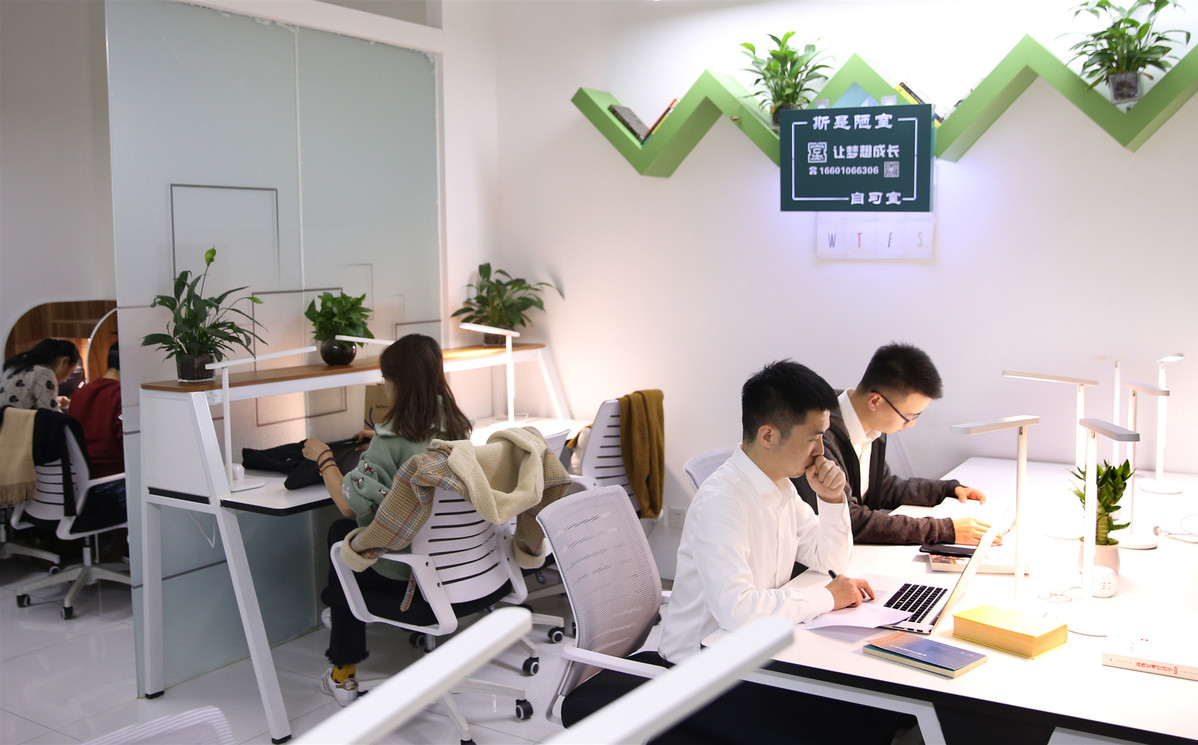What's a student to do with limited options for after-school study spaces? Home is a hassle. The library is full. Coffee shops are rather pricey and may close early. All-night eateries have distracting chatter and a shuffling procession of customers.

Customers study in a paid lounge in Dongcheng district in Beijing on Nov 20. (Photo: China Daily)
Learning is hard enough without all that, especially for younger professionals trying to squeeze in additional time after work to improve themselves in various disciplines or areas of personal interest.
Now you can pay a fee for the privilege of plopping yourself down in a quiet study lounge — a new concept in the sharing economy that's designed for people on the go who need space to think. The lounges are comfortable. Some offer refreshments. You may even be allowed to stay all night, with a bottomless cup of coffee.
Japan and South Korea were study lounge pioneers back in 2011. The niche concept showed up a few years ago in the popular South Korean sitcom Reply 1988 and has now spread to Beijing and other Chinese cities. More than 30 are scattered throughout the capital's Zhongguancun tech hub and in Chaoyangmen and central business district areas.
Patrons — typically between 20-35 years of age — gain entry to a study lounge with a numeric code or a national ID card. They may sit around all day reading books and preparing for exams. It's a placid environment that fosters focused thinking.
Everybody has a desk and there's room to stretch one's limbs or enjoy refreshments in silence. You can even bring your own snacks.
"We created a comfortable environment for them to ease the anxiety of daily life," said Li Yunqiao, a 30-year-old financial industry worker, who founded Humble Study Room in Chao-yangmen with a colleague in September.
The lounge is open from 8 am to 10 pm seven days a week, but Li said he has received requests for extended hours.
At noon on weekdays, the lounge is filled with like-minded learners from many places in the capital, including white-collar workers who want to upgrade their education.
Sun Xueqiong, 32, who took the national civil service exam in November, described how she would take a taxi from her home in Shijingshan district, about 20 kilometers east of downtown, to Humble Study Room every morning for weeks to prepare for the test. She made arrangements with her family to care for her 2-year-old daughter, who demands all her attention when she is at home.
"I looked for a place nearby so I could study, but the library near my home was usually crowded with students. I had to get in line before 6 am every day to get a seat inside, if I was lucky," Sun said.
Sun said she preferred to study away from home in order to focus all her attention on the material.
"My learning efficiency improved a lot when I started going to the study lounge," she said. It freed her of distractions and she is able to afford the 500 yuan ($71.45) fee for a month's access to the lounge.
Zhang Bingyue, 29, who runs a study lounge nestled between research institutes and academies in Beijing's Haidian district, said his business is still in debt and has yet to make a profit, but it's coming along. He said he invested 400,000 yuan in the startup, which has 130 square meters of floor space.
"Nearly 1,000 people came to study in the first month," he said. "Currently, we have about 53 seats in three different zones — with 50 to 60 percent daily occupancy rates."
The study lounge charges about 38 yuan per day.
Zhang's lounge also allows paid customers to swipe their cards after a certain hour and stay all night if they so choose.
A search on Dazhong Dianping, China's Yelp-like business-review service platform, turned up 31 paid study lounges in Beijing, 47 in Shanghai and 24 in Chengdu, Sichuan province.
Looking toward the future development of the study lounge sector, Zhu Wei, an associate professor of communications law at China University of Political Science and Law, said the paid spaces have found a natural urban market, which previously didn't serve study needs.
"The quiet learning atmosphere has created a relatively positive environment for people," Zhu said.
However, Zhu said that the potential safety and security hazards of lounges that stay open all night should be properly addressed.
But what matters most to Li Fengjiang, a 47-year-old IT senior manager in Beijing, is availability.
Uneven distribution of study lounges is a problem, he said, as most of them are located in Hai-dian or central Beijing.
Li plans to pursue an MBA at the Beijing Institute of Technology and is preparing for a major exam in late December. He seeks quiet environments that allow him to use his limited time well.
Study is particularly important because competition for jobs has become fierce, he said — and it's not just with other people but also with AI technology. There's greater urgency nowadays to learn and expand one's mind.
Meanwhile, some shared study rooms outside of Asia have become trendy places for students, freelancers and young entrepreneurs to hang out. And some of the concepts developed there have been adopted by Beijing study lounge operators.
Wu Sansan, a 25-year-old entrepreneur who set up Moments, a study lounge near Chaoyang Park, said she learned from the experience of La Permanence, a shared learning space in central Paris, to not only provide study spaces for students but also to convey an idea of building a communal and social space.


